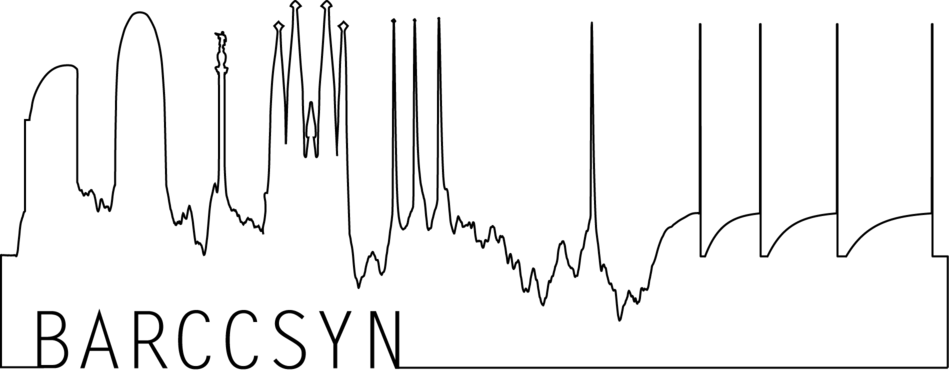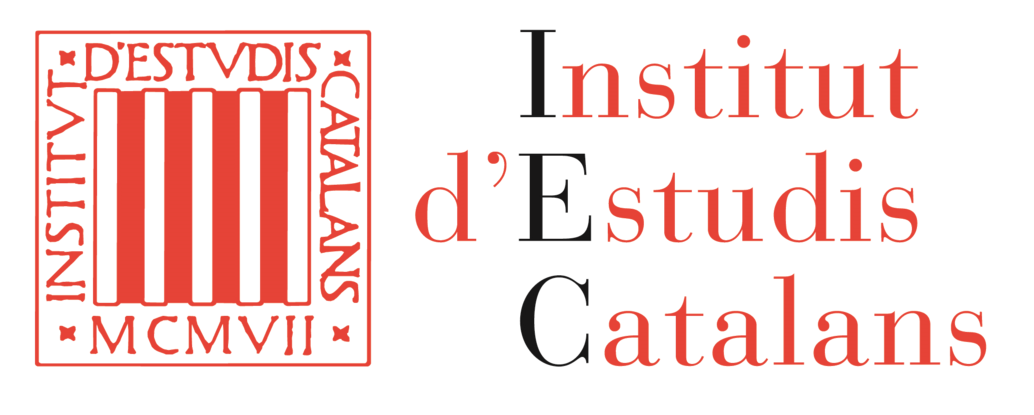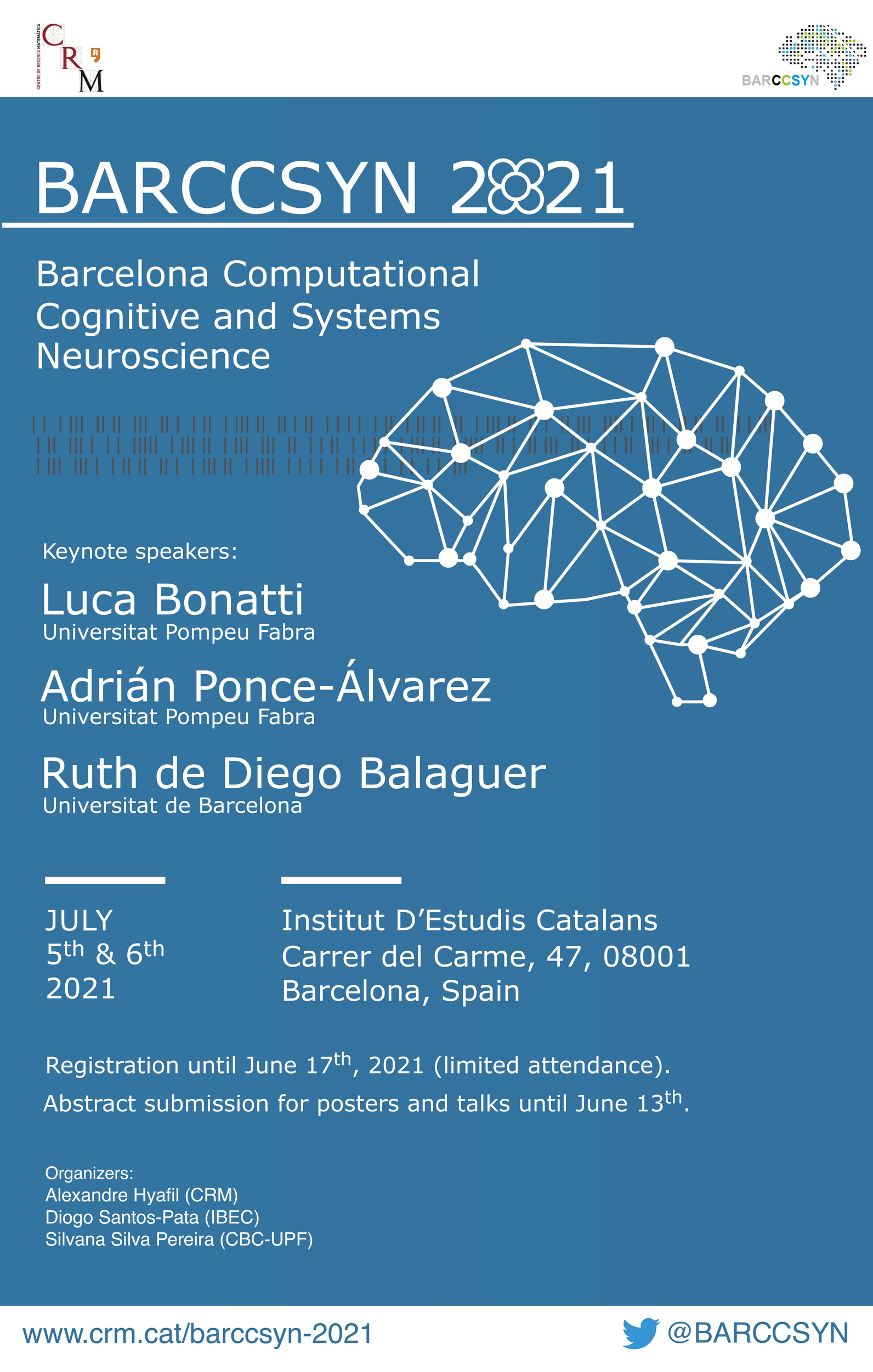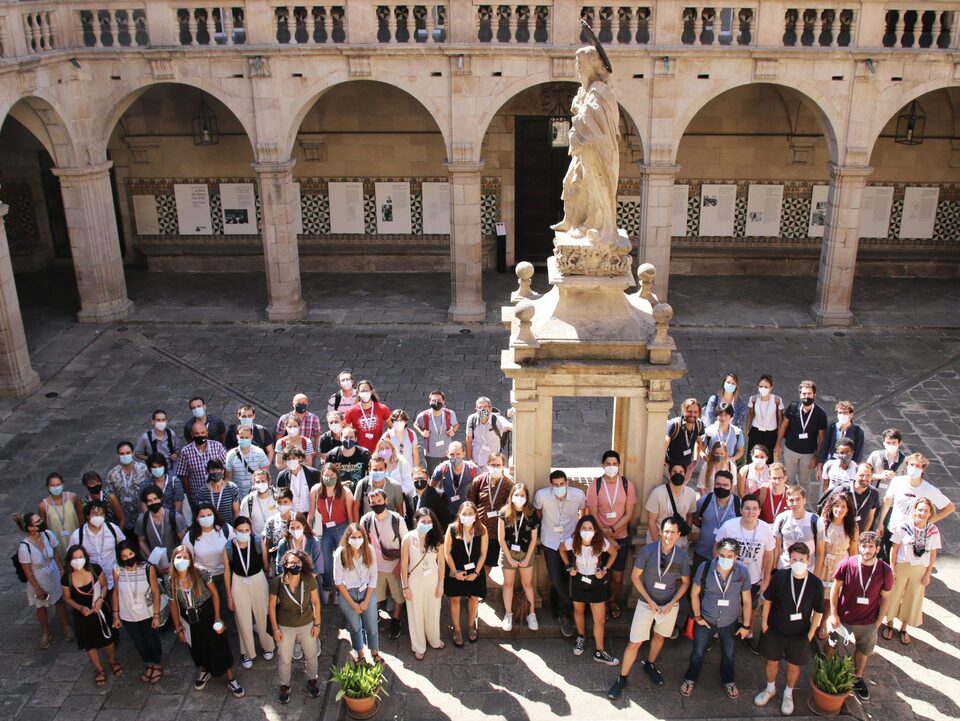Barcelona Computational, Cognitive and Systems Neuroscience (BARCCSYN) 2021
Sign into July 06, 2021
The activity will be held in person at IEC (Institut d'estudis Catalans). If you need an invoice for the registration payment, please write us to crmactivitats@crm.cat after finishing the process of registration, indicating your name and the activity.
SCHEDULE
BOOKLET
Workshop’s information

Organizers
Abstract
Keynote speakers
From Input Statistics to Abstract Knowledge Learning from Speech
Ruth de Diego Balaguer (ICREA-UB)
Abstract
Speech is a very complex auditory stimulation. When trying to decode it to learn the Language conveyed in it a learner needs to compute the statistic relations between the specific sounds in this input. However it is also necessary at one point of learning to ignore these specific sounds in order to be able to create more abstract knowledge about classes of words (i.e. nouns, verbs, etc.) and their relations to be able to generalise and be fluent in a Language. In the talk I will review research providing evidence of how different aspects of attention from automatic capture to the ability highlight or ignore relevant information are essential in these different stages of learning. In this endeavour I will propose that the existence of concurrent cues in the statistic relations between elements are essential to be able to guide attention to generate abstract knowledge. I will also illustrate how different brain networks need to work in coordination at different stages for this learning to occur.
Macroscopicquantities of collective brain activity during wakefulness and anesthesia
Adrián Ponce Álvarez (UPF)
Abstract
The study of states of arousal is key to understand the principles of consciousness. Yet, how different brain states emerge from the collective activity of brain regions remains unknown. Here, we studied the fMRI brain activity of monkeys during wakefulness and anesthesia-induced loss of consciousness. We showed that the coupling between each brain region and the rest of the cortex provides an efficient statistic to classify the two brain states. Based on this and other statistics, we estimated maximum entropy models to derive collective, macroscopic properties that quantify the system’s capabilities to produce work, to contain information and to transmit it, which were all maximized in the awake state. The differences in these properties were consistent with a phase transition from critical dynamics in the awake state to supercritical dynamics in the anesthetized state. Moreover, information-theoretic measures identified those parameters that impacted the most the network dynamics. We found that changes in the state of consciousness primarily depended on changes in network couplings of insular, cingulate, and parietal cortices. Our findings suggest that the brain state transition underlying the loss of consciousness is predominantly driven by the uncoupling of specific brain regions from the rest of the network.
What infants can think, maybe.
Luca Lorenzo Bonatti (ICREA-UPF)
Abstract
Recent data suggest that preverbal infants possess remarkable capacities to process complex events and modify hypotheses about them facing inconsistent evidence. I will present data about the behavioral and neural correlates of some of these processes in infants and adults, focusing on elementary logical inferences. I will critically discuss various proposals about the mental representations underlying these capacities.
List of participants
Click to open
| Adrian Arias Abreu | Universitat Pompeu Fabra |
| Raphaël Bergoin | Universitat Pompeu Fabra |
| David Bestué | Universitat de Barcelona |
| Luca Bonatti | Universitat Pompeu Fabra |
| Angel Bujalance Gómez | Universitat de Barcelona |
| Eva Carrillo i Félez | IDIBAPS |
| Miguel_Angel Casal Santiago | Italian Institute of Technology |
| Gloria Cecchini | Universitat de Barcelona |
| Alexis Cerván | IDIBAPS |
| Pau Clusella | Universitat Pompeu Fabra |
| Albert Compte | IDIBAPS |
| Ignasi Cos | Universitat de Barcelona |
| Josephine Cruzat | Universitat Pompeu Fabra |
| Francesco Damiani | Universitat Pompeu Fabra |
| Krubeal Danieli | Centre de Recerca Matemàtica |
| Ruth de Diego Balaguer | Universitat de Barcelona |
| Eleonora De Filippi | Universitat Pompeu Fabra |
| Jaime de la Rocha | IDIBAPS |
| Michael De Pass | Universitat de Barcelona |
| Federico Devalle | Centre de Recerca Matemàtica |
| Daniel Duque | IDIBAPS |
| Anira Escrichs | Universitat Pompeu Fabra |
| Jose_M. Esnaola-Acebes | Centre de Recerca Matemàtica |
| Anaïs Espinoso | Universitat Pompeu Fabra |
| Sergio Faci-Lázaro | Universidad de Zaragoza |
| Adrián Fernández Amil | Institute for Bioengineering of Catalonia (IBEC) |
| Clara Fernández López | Universitat de Barcelona |
| Demetrio Ferro | Universitat Pompeu Fabra |
| Adrià Galan Gadea | Neuroelectrics Barcelona SL |
| Santiago Galella | Universitat Politècnica de València |
| Elvira García Guzmán | Universitat Pompeu Fabra |
| Elif Gizem Kain | IDIBAPS |
| Maria Guasch Morgades | Neuroelectrics |
| Oscar Guerrero Rosado | Institute for Bioengineering of Catalonia (IBEC) |
| Antoni Guillamon | Universitat Politècnica de Catalunya |
| Lluís Hernández-Navarro | IDIBAPS |
| Gemma Huguet | Universitat Politècnica de Catalunya |
| Alex Hyafil | Centre de Recerca Matemàtica |
| Sara Ibañez | Centre de Recerca Matemàtica |
| Prakash Kavi | Universitat Pompeu Fabra |
| Luca Lorenzo Bonatti | Universitat Pompeu Fabra |
| Alexandre Mahrach | IDIBAPS |
| Ludovica Mana | Universitat Pompeu Fabra |
| Chiara Mastrogiuseppe | Universitat Pompeu Fabra |
| Manuel Molano-Mazón | IDIBAPS |
| Ernest Montbrió | Universitat Pompeu Fabra |
| Rubén Moreno Bote | Universitat Pompeu Fabra |
| Pedro Omedas | Institute for Bioengineering of Catalonia (IBEC) |
| Tiffany Oña Jodar | IDIBAPS |
| Duygu Ozbagci | Universitat Pompeu Fabra |
| Jordi Pastor | IDIBAPS |
| Paula Peixoto Moledo | IDIBAPS |
| Alexis Pérez-Bellido | Universitat de Barcelona |
| Thomas Pfeffer | Universitat Pompeu Fabra |
| Nicolás Pollan Hauer | Centre de Recerca Matemàtica |
| Adrián Ponce Álvarez | Universitat Pompeu Fabra |
| Jorge Ramirez Ruiz | Universitat Pompeu Fabra |
| Adam Ranson | Universitat Internacional de Catalunya |
| David Reyner Parra | Universitat Politècnica de Catalunya |
| Anna Rifé | Universitat Pompeu Fabra |
| Emma Roscow | Centre de Recerca Matemàtica |
| Alex Roxin | Centre de Recerca Matemàtica |
| Giulio Ruffini | Neuroelectrics Barcelona SL |
| Marcel Ruiz Mejias | Universitat Pompeu Fabra |
| Marc Sabio | Universitat de Barcelona |
| Ludovico Saint Amour di Chanaz | Universitat de Barcelona |
| Jordi Saludes | Universitat Politècnica de Catalunya |
| Diogo Santos-Pata | Institute for Bioengineering of Catalonia (IBEC) |
| Carolina Schneider Bender | Universitat Pompeu Fabra |
| Marc Schwartz Pallejà | Universitat Pompeu Fabra |
| Balma Serrano Porcar | Universitat de Barcelona |
| Vivek Sharma | Universitat de Barcelona |
| Silvana Silva Pereira | Center for Brain and Cognition (CBC-UPF) |
| Carles Sindreu | IDIBAPS |
| Maria Sol Vidal Saez | Universitat Pompeu Fabra |
| Jordi Soriano Fradera | Universitat de Barcelona |
| Ismael T. Freire | Institute for Bioengineering of Catalonia (IBEC) |
| Adrià Tauste Campo | Universitat Pompeu Fabra |
| Melanie Tschiersch | IDIBAPS |
| Laura Ulysse | Universitat Pompeu Fabra |
| Alice Vidal | Universitat Pompeu Fabra |
| Citlalli Vivar Aburto | Centre de Recerca Matemàtica |
| Xiongbo Wu | Universitat de Barcelona |
| Pan Ye | Centre de Recerca Matemàtica |
| Gorka Zamora-López | Universitat Pompeu Fabra |
| *Updated June 30, 2021 |
Poster and contributed talks
Participants have the option to contribute with a talk or with a poster. The poster boards measure one meter wide by two meters high.
Prizes
There will be prizes for the best students contributions
Lodging information
Acknowledgements

|
For inquiries about the activity please contact the research programs coordinator Ms. Núria Hernández at nhernandez@crm.cat
|





